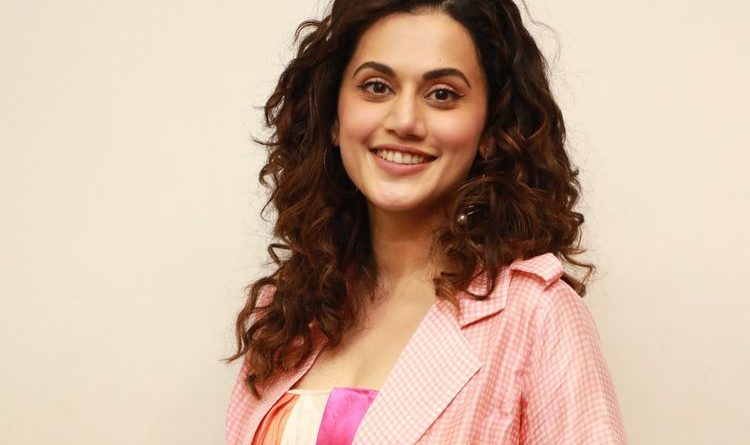Taapsee: I would not play a Kabir Singh unless there was payback for that behaviour
Taapsee Pannu opens up on Thappad being compared to Kabir Singh, Bollywood’s contribution in changing mindsets, and her biggest fear.
On February 28, Taapsee Pannu takes the stage as Amrita, or the more endearing Ammu, in Anubhav Sinha’s Thappad. Her on-screen persona of the docile and calm Ammu, however, is far removed from the Taapsee sitting across us, as we speak to her just ahead of the release. “Taapsee is an impulsive person,” she says, thumping the table, “But Ammu is not,” she explains.
Is there something of Ammu she has imbibed? She sighs and leans forward, “Patience!”
Dressed casually in off-white linen pants and a pink linen top, minimal make-up on, Taapsee has flown into the national capital early morning and has had to park herself at that corner of the table, talking to journalists one after another. “Patience,” Taapsee repeats. Indeed.
We continue talking.
Excerpts from the interview:
How did Amrita change you? Through the course of Thappad, did you identify little things as wrong, that you probably ignored or let go of earlier?
Not changed, as such. I always knew these things, which is also why I chose to do Thappad. But I have definitely learned how to deal with them better and to be more patient like Amrita. Taapsee is an impulsive person. She isn’t someone to think about how her words or actions might affect others. Mujhe jo thik lagega, main kar dungi (I will do what I think is right). Amrita isn’t that person. She will take into account how her actions might affect others, ensure no one is hurt, and then act.
But isn’t this ‘think about others’ what’s holding most of us back?ADVERTISEMENT
It would if you decide against doing it. But one needs to ensure the damage is minimal. Like in Thappad, Amrita knows that her decision to divorce Vikram, her husband (played by Pavail Gulati) will affect him and the rest of the family. She doesn’t stop because of that, instead she steadily moves ahead, sternly sticking her ground, ensuring that she stands up for the wrong without hurting anyone in the process.
We saw Chhapaak in January and now Thappad, both holding a mirror to misogyny and patriarchy. But do films really have the power to change the society?
No, they don’t. We’re giving Bollywood way too much power if we were to believe that it could change the society. At the most, it can trigger a conversation. It doesn’t matter how long that conversation lasts, any conversation at the moment is important. That I think both Thappad and Chhapaak have done.
Thappad is the story of an urban couple based in Delhi. Was the upper-middle-class connect a conscious decision? Could Thappad have been based in a Tier-3 city?
It could have been set in a Tier-3 city, but inka urban lifestyle dikhana zaroori tha (showing their urban lifestyle was important) simply because many of us feel ki inki society mein aisa nahin hota (that such things do not happen in their society). That will have a larger connect with the audience, and also help hold a mirror to the wrongs we’re doing, despite being supposedly educated and aware.
Is messaging ever the aim of a film?
No, that should never be the aim…
But, at the same time, there’s a certain responsibility you shoulder. How do you balance it?
Absolutely. You can never present a biased point of view because then you’re cutting off a section of the society. Also, when you lay out the story and allow the audience to decide for themselves, there’s more involvement on their part, which I feel makes it a more exciting experience for the audience.
And what about the personal responsibility as an actor? Like what kind of scripts will you choose or reject…
Oh that’s a tricky one. But I am aware that I’m working in Bollywood and not in Hollywood where the audience is capable of seeing cinema and the actor as purely cinema and actors. Here, the audience is passionate, they have temples for actors. So, we are big influencers in a way. Like after Salman Khan’s Tere Naam, everyone on the streets had that hairstyle. And when Shah Rukh Khan said “pyaar dosti hai”, we started looking at our friends differently. So we cannot deny that there’s a huge responsibility, and one needs to be aware of it. I am.
And that brings us to the next question. The trailer of Thappad immediately placed it as a foil to Kabir Singh. Internet compared the two, most hailing Thappad for getting right what Kabir Singh got wrong. Do you agree with this comparison?
It is, frankly, belittling to say that we made an entire movie just to respond to Kabir Singh or Arjun Reddy before that. Thappad was conceived before Kabir Singh released. It just so happened that when the trailer dropped, Kabir Singh was still hot in the market.
But yeah, that’s where your previous question comes in – responsibility. As an actor, I would not play a character like that if it were offered to me, unless I know that at the end of the story, there’s a payback for him for behaving that way. There has to be some ramification. Not that I have anything against grey characters; I have played an antagonist, and honestly, it’s an actor’s candy to play grey shades. But within the scope of that film, if he walks out without any punishment, I have a problem. I know, a popular argument is that Kabir has suffered enough internally, but that isn’t enough for me. Now, I’m not saying that that actor shouldn’t have done the role, to each their own.
As far as the comparison is concerned, Kabir Singh wasn’t about that one slap, no? There were a lot of other things in that film. That slap stuck to a certain section of the audience and when Thappad’s trailer came out, they were triggered.
Is there a particular role you look back at now and think that perhaps you would have done it differently, or even said no to?
I would have performed every role differently. Even Thappad. The first time I saw Thappad was at the edit. And I hated myself. I felt there was so much room for improvement. Anubhav sir didn’t think so, he was happy, but I am too critical. And that’s for all my older films.
As far as choosing differently is concerned, I think the films I did before Pink, where I was kind of testing the waters to see where my career is headed. When Pink happened, I knew my direction thereon.
OTT right now is a tough competition for films. As an audience, it’s great, because we can easily choose between watching a film and streaming something. But is that an extra pressure to get it right, both in terms of content and commerce, in movies now?
Immense pressure, especially for medium-budget films. See, small-budget films recover the cost from satellite rights, and big-budget films are massy, so they’ll have audience thronging to the theatres. But medium-budget content-driven films sometimes suffer. The audience’s general mindset anyway is that theatre mein kyu jaana, jab OTT pe aa jayegi, dekh lenge (why go to the theatres, we’ll watch it when it’s released on OTT platforms), so the bar is really high.
But more than that, I live in the fear that an audience will spend those 300 bucks and those three hours of their life on my film, walk out of the theatre and say mera time waste ho gaya (I wasted my time). Because money can be earned back, but if I hear from my audience that I wasted their time, it’s very hurtful. That’s my responsibility to the audience.




